From the undisputed master of romantic comedy, director Rob Reiner, comes And So It Goes, featuring the frankly hilarious and fetching Michael Douglas against sexy at any age Diane Keaton, for a sweet and scatological story of romance the second time around.
Widower Oren Little (Michael Douglas) is intent on downsizing, selling the family home and retiring from his profession as a real estate agent. On his way to prison, Oren’s prodigal son makes an unexpected pit-stop at Oren’s Shangri-La doorstep to deposit his daughter, Sarah (Sterling Jerins), into his father’s care. Oren quickly pawns off the responsibility for the granddaughter he heretofore did not realize existed onto his able, if reluctantly willing, next door neighbor Leah (Diane Keaton). And so the madness ensues …
It is a joy to watch the master cast in action. The consistently great Douglas seems to be enjoying a mini-Renaissance at present. As Oren Little, he sports a slightly sinister and schleppy step and a wicked sparkle in his eyes. Everything you have always loved about Keaton from her Annie Hall days is here on full display. As Reiner describes: “There is not a dishonest move she makes. She’s got this kind of nervous way of questioning everything … She’s incredibly sweet and loving, interesting and beautiful and sexy.” In her white fuzzy sweater over her white t-shirt, Keaton’s clearly still got “it.” Supporting cast includes a tell-it-like-it-is, no holds barred Frances Sternhagen as Oren’s co-worker Claire, and Frankie Valli in a cameo as a nightclub owner, with a line that brings down the house.
This is the first time that Reiner and Douglas have worked together since The American President. “I’m always attracted to characters that are not very attractive, but ultimately come around,” Douglas explains his draw to the role. “I enjoy the challenge of trying to get the audience onto my side.” The story captures that unique and privileged relationship between grandparents and grandkids and the magic of second chances for happiness in work and love.
I was delighted to speak with the insightful mensch of a director and man, Rob Reiner, about And So It Goes and his approach to storytelling. We were rather appropriately seated in The Director’s Room of the San Francisco Ritz-Carlton Hotel, as Reiner was amused to note.
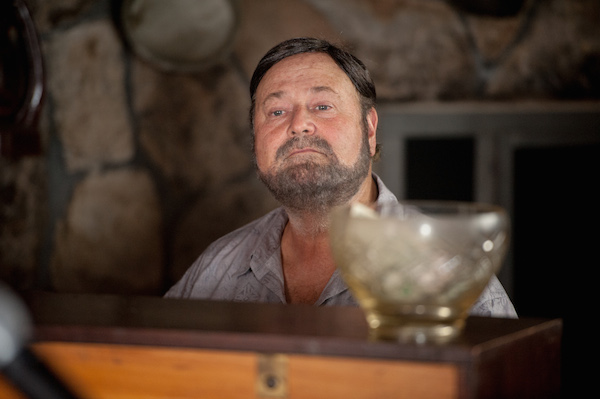
Sophia Stein: As your film opens, we hear “Both Sides Now” by Judy Collins. Hearing that song after so many years elicited in me this palpable sense of longing and nostalgia —
Rob Reiner: I know. When I decided to use that song and put it up against the picture, it did the same thing for me. It brought back incredible memories. I’ve known Judy Collins for a long, long time. When I was a writer on the Smothers Brothers Show, I was twenty-one years old when she came and performed. I was in love with her then, as I still am. I asked Judy if she would re-record the song for the film, and she agreed. Obviously, she has sung “Both Sides Now” countless times, at all of her concerts. To keep it fresh, artists usually find variations, to make it fun for themselves. So when Judy started recording the song for the film, she was putting in all these kind of ‘little curlicues.’ I pulled her aside, “You know, Judy, what I want is exactly that iconic sound that I remember when you first recorded it.” So she said, “O.k., o.k.” I kind of had to remind her — and I’m not a great singer, but I sing on pitch. It was kind of idiotic, here I am showing Judy Collins how to be Judy Collins. She did it unbelievably great!
Sophia: Her voice sounds pristine, as if she were twenty years old.
Rob: It’s the same. This is a woman who is in her seventies now, and it sounded exactly the way it did when she first sang it. You know, it’s clear as a bell.
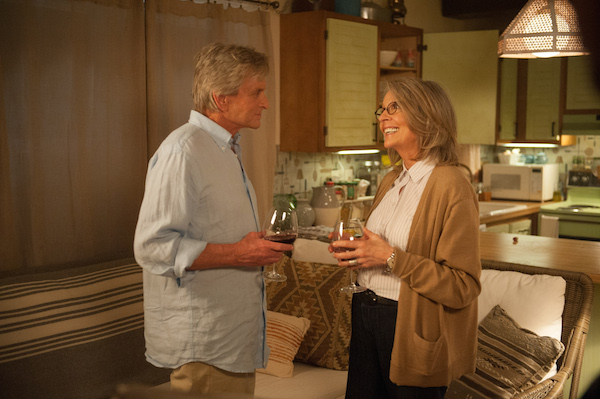
Photo by Clay Enos. Courtesy of Clarius Entertainment.
Sophia: What was your inspiration for the title of the film?
Rob: When we did the press junket for The Bucket List (2007), everybody asked us, “What’s on your bucket list?” When they asked Jack [Nicholson], he would say, “I sit in my living room with my feet up on the coffee table and I ask myself, is there time for one more great romance?” So this got me thinking about the idea of meeting somebody later on in life. We hired Mark Andrus, who had written As Good As It Gets (1997) to write this. He came up with that title. At first I was kind of agnostic about it. We looked to try to find some other titles, but I kept going back to his original title because it kept making sense to me.
You intellectualize certain things when you’re younger, things that as you get older, you internalize and really begin to understand. The idea of the doing of something and existing now in the process, of not thinking about the future, of embracing what you have because you don’t know when it’s going to go away. That life is precious, that every moment is precious — you start really understanding this.
I remembered a great line from this play by Gore Vidal that became a movie called The Best Man (1964). In the film, Henry Fonda plays William Russell, an Adlai Stevenson, thoughtful, intellectual type, and Cliff Robertson plays Joe Cantwell, a red-baiter kind of guy, who’ll go for the jugular every time. They are both vying for the nomination of their party, trying to get the endorsement of the former President, a Harry Truman type played by Lee Tracy. There is a moment when the old President is sitting with Cantwell: “Let me ask you something, Joe, do you think that the ends justify the means?” “I do, sir,” Cantwell admits. “Well, let me tell you something, Joe – there are no ends, only means,” the President replies. It was a great line. I remembered hearing it when I first saw the picture. But I’ve started really understanding what that line means. It’s the And So It Goes of it. We are just going along here, and we have to embrace everything as we live it. It’s a philosophical thing that you start understanding a lot more deeply as you get older.

Photo by Clay Enos. Courtesy of Clarius Entertainment.
Sophia: Was the screenplay originally written by Mark Andrus with Jack Nicholson in mind for the role?
Rob: By the time we finished it, Jack had already said that he didn’t want to act anymore. He kind of said that he was retired from acting — which was a shock to everybody. The idea that I could get to work with Michael [Douglas] again, that Michael would agree to do this was like a dream. The character, Oren Little, has this curmudgeonly aspect. Michael has those qualities. He can play a guy who is cantankerous and mean and all those things, but he is a likeable person, and it kind of bleeds through. You’re waiting for that side of him to come out. It takes these two women — the older woman [Leah played by Diane Keaton] and the younger woman [his granddaughter Sarah, played by newcomer Sterling Jerins] — to basically bring out his humanity.
Sophia: Once Michael Douglas was cast, did Andrus custom tailor the role for him?
Rob: Once Michael was in, and we knew that Diane was in, we re-worked it for the two of them. I always do a draft with my partner Andy Scheinman. Diane was very articulate about what she felt she could do. Before we started shooting, she noted, “I don’t act, you know. I just am who I am.” “Well whatever that is, it’s pretty good,” I told her, “because we have loved that over the years!” Diane is right in that there’s really no delineation between who she is off-camera and who she is on-camera. She’s very instinctive, makes the dialogue her own, she’s very improvisational. Initially, Leah was somebody who embroidered these tapestries. Diane had this idea that Leah was a singer, which I loved. Here she is, sixty-five and taking on this new career at that point in her life. We’re living older in many cases today, and sometimes we have two and three careers in the course of a lifetime. I also loved the fact that it resonated with my mother [Estelle] who at sixty-five, started a singing career. We worked very closely on picking songs that Diane felt comfortable singing.
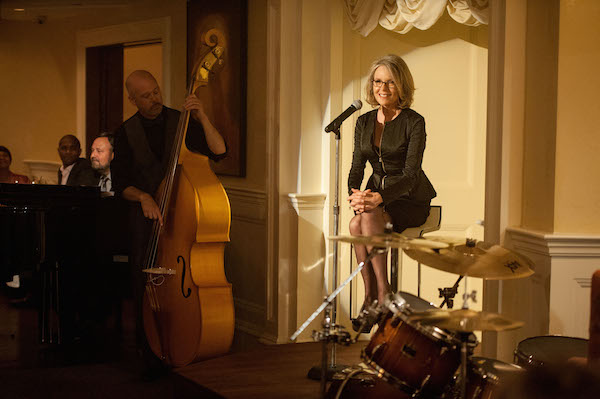
Photo by Clay Enos. Courtesy of Clarius Entertainment.
Sophia: During filming, when Diane Keaton asked you, “Can I do the sex scene with my clothes on?,” how did you respond?
Rob: I said, “Well, Diane, first of all, we’re not going to show anything like that, but we will show the aftermath of it. And you know, you can’t have your clothes on in the bed. I mean, that doesn’t make sense.” It did give rise to a wonderful line. As they’re walking towards the bedroom to make love for the first time, she tells him, “I’m leaving my bra on.” I liked that line a lot.
Sophia: There is a moment in the film where Mike Douglas is standing in front of the fourplex and he’s a little drunk, and he waves his hands into the air and pronounces “Little Shangri-La!” It’s absolutely hysterical! Was that in the original script or was that improvised?
Rob: That was in the script. First of all, we changed the name of the complex to Little Shangri-La, so that it was Oren Little’s name. Then, I just liked the idea that he just thinks this place, that’s named after him, is the greatest thing in the world. And Little Shangri-La is the most un-Shangri-La place you could ever be! But Oren’s a little drunk, so he’s so excited that he’s at Little Shangri-La.
Sophia: Actors love working with you. What is your secret?
Rob: Well, I’m an actor, so they know that I’m not going to ask them to do anything that I couldn’t do. There is never a time when an actor is going to do blocking in a scene that is unmotivated or that they don’t feel comfortable with because I know what it’s like to do that. I’ve been in their position. I think that is a big part of it. I just know what they go through.
Sophia: In the film, you play Artie, the devoted accompanist. You found “an actor who would work for scale.”
Rob: I didn’t have a lot of money, so I looked around, and I found myself, basically. I jumped at the chance because I got to wear an undetectable toupee, and that’s always a plus when you’re playing a part. Finding the hairpiece was quite a process. At one point, we cut it, and I looked like Hitler. ‘Geez, this isn’t good. Jewish guys shouldn’t be looking like Hitler,’ I thought. Adjustments were made, it’s completely undetectable.
Sophia: How do you feel about acting in a film that you are also directing?
Rob: I’m not a big fan of doing both [directing and acting] on the same project because your attention gets bifurcated. It’s kind of confusing. I would much rather either just focus on the directing … Or I love acting! So if somebody wants me to come in there, I’d love to. It’s a lot easier because there is not a lot of responsibility, not a lot of headaches, you just have to focus on doing what you do. So I’d rather do one or the other, but you know, I’ve done both few times, and it’s o.k.
Sophia: I grew up watching All in The Family when the ritual of watching television was a national, unifying event. All in The Family remains one of the most perfect, socially relevant shows, certainly of my lifetime, maybe of all time. Is there anything on TV right now that you feel excited about in that way?
Rob: I like a lot of things on television. You said something that was really interesting: “a nationally unifying event.” There isn’t anything like that now. Everything is so fragmented today. There are so many hundreds and hundreds of channels, and all of them are aimed at niche demographics. When All in The Family was on, there were only three channels, three networks, and there were 200 million people in the country. There were no DVRs. There was no TiVo or anything like that. If you wanted to watch a show, you had to watch it when it was on. So every Saturday night, there were 40 million people having that shared experience. That has a tremendous power, you know. So not only were they watching a show that was ground-breaking, in a way, and dealt with all these social and political issues, but they were doing it at the same time as everyone else and then talking about it the next day. We don’t have anything like that now. We have a country of 315 million people or so, maybe more. If you have a huge hit, you’ve got maybe 12-14 million people watching. So it’s a different time.
That’s not to say there aren’t great things on television. In a way, I think that we’re in the second golden age of television right now – between Breaking Bad, and Homeland, and House of Cards, and a show like Louie, which, to me, is a brilliant television show. So there’s a lot of great stuff on television.
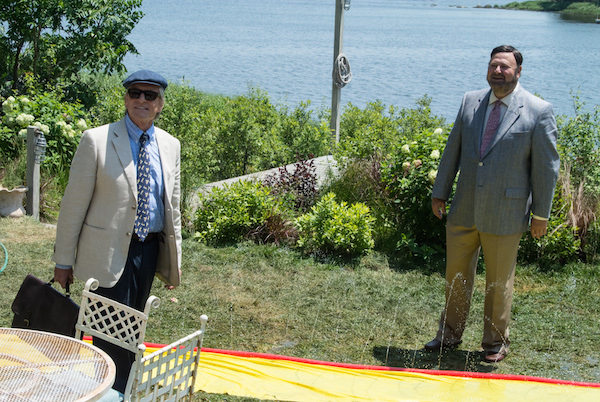
Photo by Clay Enos. Courtesy of Clarius Entertainment.
Sophia: Your production designer, Ethan Tobman, went to great lengths to create this wonderful location in Connecticut. His team built a hundred foot dock, planted six thousand feet of grass and foliage, affixed wood shingles to this house, aged them, and personalized Keaton’s apartment for her character.
Rob: The script called for a fourplex on the water which was incredibly difficult to find. We were shooting in Connecticut for a number of reasons. For one thing, it’s beautiful there, but we also had tax credits so we could make the picture at the right budget. We went up and down the coast looking for a place that we could transform into the location that script described. Ethan did an amazing job on the place.
Sophia: Tobman has remarkable credits as a designer of music videos and album covers for stars that have included Madonna, Eminem, and Lady Gaga.
Rob: Ethan is an interesting guy. He is an incredibly talented, creative, inventive designer. He has staged Super Bowls and Beyoncé concerts. He has had a lot of experience doing big splashy productions. So for him, a movie like this, where you don’t get paid a lot, he almost does it for the fun of it, for the artistic challenge. I loved working with him. I would work with him anytime I could.

Photo by Clay Enos. Courtesy of Clarius Entertainment.
Sophia: Oren is selling the family home. That house was his identity. In the end, the new owners reassure him: “We will love your home for you, and you will always be welcome back.” That brought tears to my eyes. Is that kind of attachment to home, something personal for you?
Rob: Oren is a guy that lived thirty-two years in that house, so he is attached to his home. I never had that growing up because we moved around. When I was seven or eight years old, we moved to New Rochelle, and when I was thirteen, we moved to California. I went back to my childhood home in New Rochelle when I was scouting for locations for this film, and the current owners let me look around. All of these moments and memories just flooded right back in. It was an incredibly emotionally powerful experience. It’s not the physical house, but the emotional content of the house.
Sophia: When I was in the movie theatre, at the end of this film, an older woman seated next to me, a stranger, turned to me and asked, “What did you think of the movie?” I said that I thought it was incredibly sweet. She touched my arm and said, “You know, I needed this movie. I’m going to go home and I’m going to watch the news about all the horrible things that are happening in the world, but I really needed this.” She sighed with relief. I thought, there is an audience hungry for this type of story.
Rob: When we were doing The Bucket List, we made the joke that of our desired demographic, “There was a 100% desire to see the movie, with a 40% ability to get to the theatre.” The Baby Boomers are still the largest bulge of the population. The truth of the matter is, if there is something in the theatre for them to see, they will come. We grew up on movies, where all you did was watch the movie. You didn’t have an electronic device in your hand while you were watching a movie. With The Bucket List, we showed no question about it, there is an audience out there and that people will come.
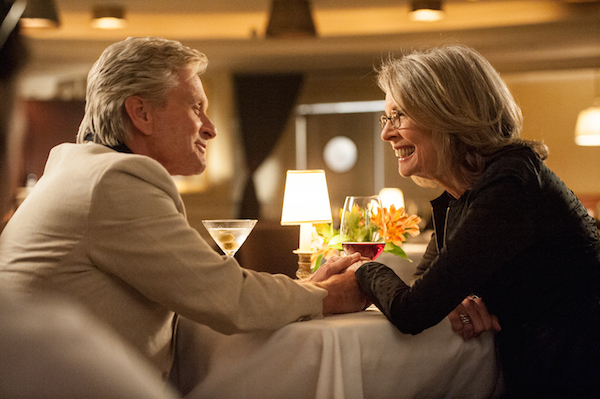
Photo by Clay Enos. Courtesy of Clarius Entertainment.
Sophia: Oren and Leah are two characters who have decided that they are done with romance, they are not looking to become romantically involved again. Yet, somehow they find each other. There is a sweetness to this idea that you can have romance at any age.
Rob: Well, I think that’s true. There’s an awkwardness entering into a relationship with somebody no matter what age you are — for different reasons. When it’s the first time, you’re nervous about that. As you get older, particularly when you have experienced closeness and marriage and a relationship — and in the case of Oren and Leah, both have experienced their spouses passing away — you know what’s at stake there. You know how painful it can be to lose somebody — whether through divorce or through your partner passing. But it doesn’t mean you shouldn’t keep embracing what’s out there. Because it’s about accepting and enjoying your life while you have it. So if you meet somebody at that stage, you should just go for it.
Sophia: I have a Great Aunt Roz who lost her husband when she was 72-years old. The following year, the wife of a mutual friend on her deathbed, instructed her husband, Norman, to go to Florida and get my Aunt Roz. At the age of 88, Norman came courting my Great Aunt. They are still together. Norman just celebrated his 96th birthday.
Rob: So they have been together for what, eight years now? That’s eight years that they have enjoyed one another’s company. That’s great. You see, that’s how it should be.
Sophia: You are also in town for the screening of the documentary film The Case Against 8 at Frameline Film Festival? What was your involvement in that project?
Rob: Me and my wife and Chad Griffin and Kristina Shake, the four of us started the American Foundation for Equal Rights, which was the organization that filed the first federal court challenge for marriage equality. We raised the money, hired the lawyers — David Boies and Ted Olson to try the case — and eventually it got to the Supreme Court where we were able to overturn Proposition 8 which allowed gays and lesbians to marry in California. It’s a great movie! It’s a documentary that plays like a feature film. You’ve got the four Plaintiffs who you are completely invested in, these incredible lawyers, and then it has this great happy ending. We overturned Proposition 8, and you have two couples getting married. And it was all real! It all happened.
Sophia: You are the undisputed master of romantic comedy. The Princess Bride and When Harry Met Sally are national treasures and two of my all-time personal favorite movies. Is romantic-comedy your favorite genre to direct?
Rob: You know, I don’t think of it that way. I think of it as — men and women. What are men and women about? That’s what I’m interested in. Hopefully, there’s a dramatic element and a humorous element; I try to blend the two. Whether it’s Flipped (twelve-year olds), or The Sure Thing (college kids), or When Harry Met Sally (young adults and reuniting a bit later). And So It Goes (older adults) is my observation of the way men and women are with each other. If you look closely, it’s essentially the same story. They are all variations on this same theme.
You’ve got women who are definitely more evolved than men. They’re more mature emotionally, they’re more connected to their feelings, and they have a greater sense of what’s important. The men kind of run around like idiots, trying to figure out what it is that they should want. It’s the women who basically show them what’s important and help them grow up. We men are always lagging behind women, but hopefully if we meet the right woman, they’ll help us see what’s important. And so it goes …
Top Image: Oren (Michael Douglas), “AND SO IT GOES.” Photo by Clay Enos. Courtesy of Clarius Entertainment
